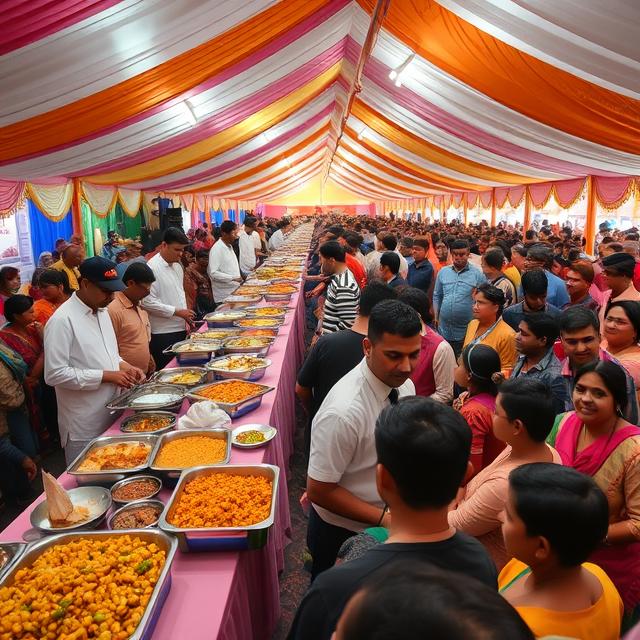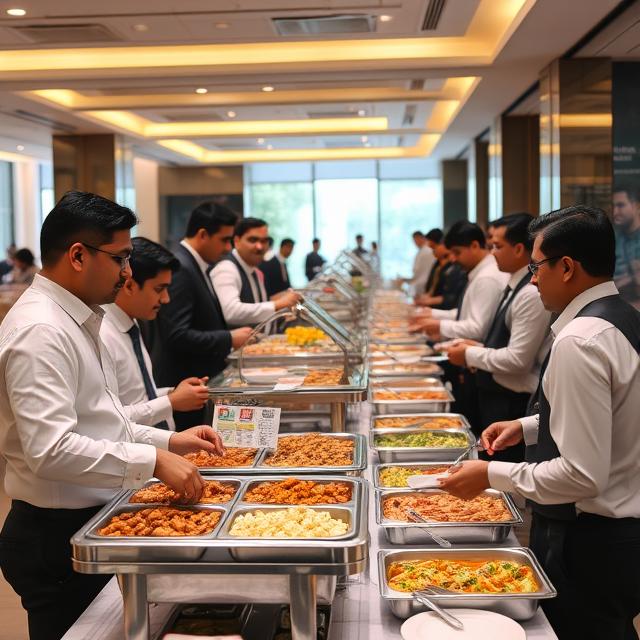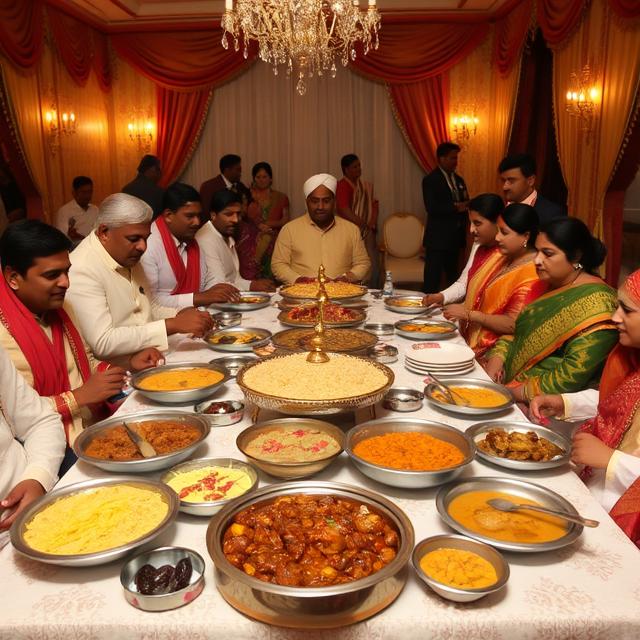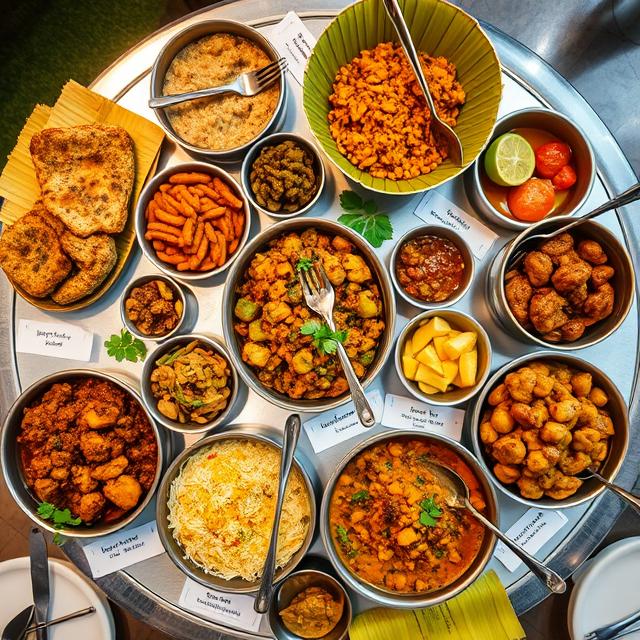Table of Contents
Introduction: Sustainable Catering Practices for Weddings in Hyderabad
Hyderabad has long been celebrated for its rich culinary heritage and vibrant celebrations. Weddings, birthdays, and personal milestones often involve elaborate catering — and in 2025, sustainability has become a key consideration.
From Kukatpally to Banjara Hills, Hyderabadis increasingly prefer eco-conscious catering that balances taste, aesthetics, and environmental responsibility.
This guide explores practical strategies used by caterers in Hyderabad for sustainable weddings and personal celebrations, helping customers make informed, responsible choices.

1. The Growing Awareness of Eco-Friendly Catering
Sustainability in catering is no longer a niche trend. It reflects a conscious lifestyle among urban clients:
- Reduced Waste: Portion control, careful menu planning, and donating leftovers.
- Eco-Friendly Packaging: Use of biodegradable, compostable plates and cutlery.
- Local Sourcing: Ingredients sourced from nearby farms reduce transportation emissions.
- Energy Efficiency: Use of induction stoves and solar-powered kitchens where possible.
Kukatpally, with its modern residential communities, has become a testing ground for such sustainable initiatives.
2. Eco-Friendly Menu Planning for Weddings
The first step toward sustainability is thoughtful menu design:
- Local Ingredients: Seasonal vegetables, grains, and traditional recipes reduce carbon footprint.
- Minimal Meat Options: Non-veg dishes limited to special selections while emphasizing vegetarian staples.
- Fusion with Purpose: Combining regional delicacies with global flavors, minimizing excess food while delighting guests.
- Dietary Accommodation: Gluten-free, vegan, and low-sugar options prevent wastage from unconsumed dishes.

In Hyderabad weddings, this ensures tasteful meals without unnecessary environmental cost.
3. Waste Management Strategies at Personal Events
Personal celebrations often produce significant food and material waste. Leading Hyderabad caterers address this via:
- Food Donation Partnerships: Surplus meals delivered to local NGOs.
- Compostable Décor: Use of reusable or biodegradable table settings and décor elements.
- Leftover Management: Efficient storage, take-home boxes, and repurposing strategies.
- Event Planning Software: Accurate guest counts reduce overproduction.
These strategies minimize landfill waste, which is critical in high-density suburbs like Kukatpally.
4. Sustainable Décor Practices
Decoration is a visible aspect of wedding and celebration sustainability:
- Natural Elements: Flowers, leaves, and bamboo décor instead of plastics.
- Reusable Installations: Stages, backdrops, and table arrangements that can be redeployed.
- Eco-Lighting: LED or solar-powered lighting setups.
- Minimalist Aesthetics: Elegant simplicity over elaborate and wasteful embellishments.
This approach reduces environmental impact while maintaining visual grandeur.
5. Water and Energy Conservation in Catering
Large celebrations can consume vast amounts of water and energy. Hyderabad caterers are adapting:
- Water-Efficient Kitchens: Recycling rinse water for cleaning.
- Energy-Efficient Equipment: Induction cookers, pressure cookers, and low-energy ovens.
- Solar-Assisted Operations: Where feasible, solar water heaters or panels for kitchen energy.
Even personal events benefit when caterers integrate eco-efficient practices without compromising service quality.
6. Transport and Logistics Optimization
Sustainable catering extends to transportation logistics:
- Centralized Kitchens: Preparing food in one location reduces multiple deliveries.
- Optimized Routes: Minimizing vehicle emissions with GPS-based delivery planning.
- Reusable Serving Containers: Reducing disposable packaging for deliveries.

In Kukatpally, these practices have reduced traffic-related waste and emissions, especially during large weddings.
7. Guest Education and Engagement
Eco-conscious events often involve educating guests:
- Signage: Indicating waste segregation and compost stations.
- Take-Home Kits: Eco-friendly boxes for leftovers.
- Interactive Food Stations: Allow guests to customize portions, reducing food waste.
This transforms guests from passive participants into sustainability partners.
8. Vendor Collaboration for Green Events
Sustainable catering in Hyderabad depends on all stakeholders:
- Floral Vendors: Supply natural or locally grown flowers.
- Décor Specialists: Use reusable or compostable materials.
- Event Planners: Incorporate sustainability into event timelines and logistics.
- Caterers: Align menus, packaging, and operations with green practices.
Kukatpally caterers collaborate with local vendors to create fully sustainable weddings and celebrations.

9. Challenges and Practical Solutions
While the trend is growing, some challenges remain:
| Challenge | Solution |
|---|---|
| Limited availability of eco-packaging | Caterers partner with local green suppliers |
| High cost perception | Menu planning and scaled operations reduce per-plate cost |
| Guest resistance to changes | Educate guests via invitations or event signage |
| Climate/weather constraints | Use temporary shelters and local sourcing for outdoor events |
Practical solutions make sustainability feasible without compromising experience.
10. Economic Impact of Sustainable Catering
Eco-friendly practices add value to both clients and caterers:
- Cost Management: Reduced waste and energy consumption lower operational costs.
- Branding Advantage: Caterers promoting green practices attract environment-conscious clients.
- Repeat Business: Guests appreciate conscious decisions, increasing loyalty.
In Hyderabad, caterers in Kukatpally and adjacent suburbs have reported 20–30% increased client retention with eco-friendly packages.
11. Future Outlook for Hyderabad Weddings
Trends shaping 2026–2030:
- Tech-Integrated Sustainability: AI menu planning, smart waste tracking.
- Hybrid Event Models: Digital participation reduces catering scale, lowering environmental impact.
- Community-Centric Sourcing: Partnerships with local farmers and artisans for ingredients and décor.
- Experiential Dining: Focus on storytelling through menus, decorations, and sustainability narratives.
Sustainable catering is set to become the standard expectation for personal and wedding events in Hyderabad.
Conclusion
Sustainable catering is no longer optional — it’s a reflection of responsible celebration culture in Hyderabad.
From Kukatpally’s neighborhoods to Banjara Hills palatial weddings, eco-friendly practices ensure taste, elegance, and environmental responsibility coexist.
By adopting menu planning, waste management, eco décor, and energy-efficient operations, caterers can deliver memorable celebrations that honor both guests and the planet.






Leave a Comment